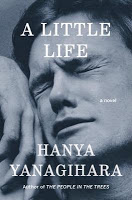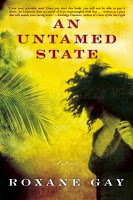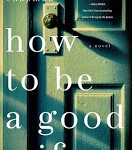I left Hanya Yanagihara’s A Little Life with two divisive yet equally powerful reactions to this masterful, difficult book. First, I loved it; I wanted to wrap it in a blanket, cuddle it and give it some tea, rub its back and reassure it that everything would be all right.
Second, I wanted to throw it away, drop it in a hole, burn it to ashes; anything so that I would never have to look at it or think about it ever again.
 A Little Life cries out for visceral adjectives: heartbreaking, gut-wrenching, devastating. Multiple times, I wondered half-seriously if the author were involved in a bet to see who could torture a fictional character most thoroughly. If so, I can assure you that Ms. Yanagihara has handily won. The story spans decades, following the lives of four friends—J.B., Malcolm, Willem, and Jude—and the various others that enter and leave their orbit. It is Jude, however, who emerges as the central character, upon whose mystery and pain the novel revolves.
A Little Life cries out for visceral adjectives: heartbreaking, gut-wrenching, devastating. Multiple times, I wondered half-seriously if the author were involved in a bet to see who could torture a fictional character most thoroughly. If so, I can assure you that Ms. Yanagihara has handily won. The story spans decades, following the lives of four friends—J.B., Malcolm, Willem, and Jude—and the various others that enter and leave their orbit. It is Jude, however, who emerges as the central character, upon whose mystery and pain the novel revolves.
When we meet Jude, he is a college student; quiet, talented, and soft-spoken, with a crippling leg injury that he will only say stems from “a car incident.” Childhood trauma is hinted at, but its sheer enormity is only gradually revealed, spooned out in small, painful doses throughout the book. What is remarkable about Yanagihara’s portrayal of suffering and its aftermath is the empathy given to both Jude, as he continually tries and fails to shirk off the weight of his past, and his friends, who attempt to love and care for him without ever entirely knowing or understanding his suffering. Yanagihara is ruthless, as she flings unending trials at her protagonist and compels her readers to feel them all along with him.
Many readers will understandably be repelled by some graphic scenes and the depressing subject matter. If you are looking for a light read with a happy ending, do not read this book. This might be the book for you if you believe the rewards of connecting, learning, and struggling with beautiful, complicated characters outweigh the heartaches of reading through their miseries.
 If you are longing for more books that treat trauma victims as subjects rather than objects but still prefer your fiction with a light at the end of the tunnel, try Roxane Gay’s 2014 debut novel, An Untamed State. The novel is written from the first-person perspective of Mireille, a rich woman and new mother who is kidnapped while visiting her Haitian parents. Gay’s prose is both blunt and poetic, and her portrayal of Mireille’s struggle is both intimate and real.
If you are longing for more books that treat trauma victims as subjects rather than objects but still prefer your fiction with a light at the end of the tunnel, try Roxane Gay’s 2014 debut novel, An Untamed State. The novel is written from the first-person perspective of Mireille, a rich woman and new mother who is kidnapped while visiting her Haitian parents. Gay’s prose is both blunt and poetic, and her portrayal of Mireille’s struggle is both intimate and real.
by Amy P.



